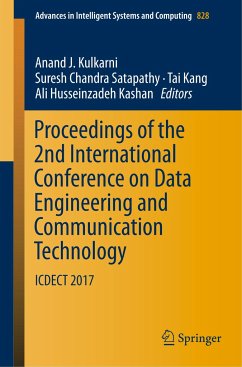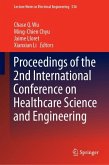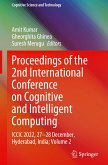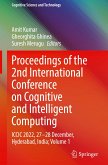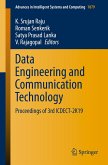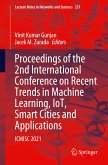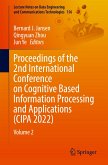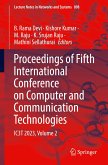Proceedings of the 2nd International Conference on Data Engineering and Communication Technology
ICDECT 2017
Herausgegeben:Kulkarni, Anand J.; Satapathy, Suresh Chandra; Kang, Tai; Kashan, Ali Husseinzadeh
Proceedings of the 2nd International Conference on Data Engineering and Communication Technology
ICDECT 2017
Herausgegeben:Kulkarni, Anand J.; Satapathy, Suresh Chandra; Kang, Tai; Kashan, Ali Husseinzadeh
- Broschiertes Buch
- Merkliste
- Auf die Merkliste
- Bewerten Bewerten
- Teilen
- Produkt teilen
- Produkterinnerung
- Produkterinnerung
This book features research work presented at the 2nd International Conference on Data Engineering and Communication Technology (ICDECT) held on December 15-16, 2017 at Symbiosis International University, Pune, Maharashtra, India. It discusses advanced, multi-disciplinary research into smart computing, information systems and electronic systems, focusing on innovation paradigms in system knowledge, intelligence and sustainability that can be applied to provide feasible solutions to varied problems in society, the environment and industry. It also addresses the deployment of emerging…mehr
Andere Kunden interessierten sich auch für
![Proceedings of the 2nd International Conference on Healthcare Science and Engineering Proceedings of the 2nd International Conference on Healthcare Science and Engineering]() Proceedings of the 2nd International Conference on Healthcare Science and Engineering121,99 €
Proceedings of the 2nd International Conference on Healthcare Science and Engineering121,99 €![Proceedings of the 2nd International Conference on Cognitive and Intelligent Computing Proceedings of the 2nd International Conference on Cognitive and Intelligent Computing]() Proceedings of the 2nd International Conference on Cognitive and Intelligent Computing265,99 €
Proceedings of the 2nd International Conference on Cognitive and Intelligent Computing265,99 €![Proceedings of the 2nd International Conference on Cognitive and Intelligent Computing Proceedings of the 2nd International Conference on Cognitive and Intelligent Computing]() Proceedings of the 2nd International Conference on Cognitive and Intelligent Computing265,99 €
Proceedings of the 2nd International Conference on Cognitive and Intelligent Computing265,99 €![Data Engineering and Communication Technology Data Engineering and Communication Technology]() Data Engineering and Communication Technology162,99 €
Data Engineering and Communication Technology162,99 €![Proceedings of the 2nd International Conference on Recent Trends in Machine Learning, IoT, Smart Cities and Applications Proceedings of the 2nd International Conference on Recent Trends in Machine Learning, IoT, Smart Cities and Applications]() Proceedings of the 2nd International Conference on Recent Trends in Machine Learning, IoT, Smart Cities and Applications201,99 €
Proceedings of the 2nd International Conference on Recent Trends in Machine Learning, IoT, Smart Cities and Applications201,99 €![Proceedings of the 2nd International Conference on Cognitive Based Information Processing and Applications (CIPA 2022) Proceedings of the 2nd International Conference on Cognitive Based Information Processing and Applications (CIPA 2022)]() Proceedings of the 2nd International Conference on Cognitive Based Information Processing and Applications (CIPA 2022)265,99 €
Proceedings of the 2nd International Conference on Cognitive Based Information Processing and Applications (CIPA 2022)265,99 €![Proceedings of Fifth International Conference on Computer and Communication Technologies Proceedings of Fifth International Conference on Computer and Communication Technologies]() Proceedings of Fifth International Conference on Computer and Communication Technologies166,99 €
Proceedings of Fifth International Conference on Computer and Communication Technologies166,99 €-
-
-
This book features research work presented at the 2nd International Conference on Data Engineering and Communication Technology (ICDECT) held on December 15-16, 2017 at Symbiosis International University, Pune, Maharashtra, India. It discusses advanced, multi-disciplinary research into smart computing, information systems and electronic systems, focusing on innovation paradigms in system knowledge, intelligence and sustainability that can be applied to provide feasible solutions to varied problems in society, the environment and industry. It also addresses the deployment of emerging computational and knowledge transfer approaches, optimizing solutions in a variety of disciplines of computer science and electronics engineering.
Produktdetails
- Produktdetails
- Advances in Intelligent Systems and Computing 828
- Verlag: Springer / Springer Nature Singapore / Springer, Berlin
- Artikelnr. des Verlages: 978-981-13-1609-8
- 1st ed. 2019
- Seitenzahl: 736
- Erscheinungstermin: 4. Oktober 2018
- Englisch
- Abmessung: 235mm x 155mm x 40mm
- Gewicht: 1095g
- ISBN-13: 9789811316098
- ISBN-10: 9811316090
- Artikelnr.: 52919819
- Herstellerkennzeichnung Die Herstellerinformationen sind derzeit nicht verfügbar.
- Advances in Intelligent Systems and Computing 828
- Verlag: Springer / Springer Nature Singapore / Springer, Berlin
- Artikelnr. des Verlages: 978-981-13-1609-8
- 1st ed. 2019
- Seitenzahl: 736
- Erscheinungstermin: 4. Oktober 2018
- Englisch
- Abmessung: 235mm x 155mm x 40mm
- Gewicht: 1095g
- ISBN-13: 9789811316098
- ISBN-10: 9811316090
- Artikelnr.: 52919819
- Herstellerkennzeichnung Die Herstellerinformationen sind derzeit nicht verfügbar.
Anand J. Kulkarni holds a Ph.D. in Distributed Optimization from Nanyang Technological University, Singapore, an MS in Artificial Intelligence from the University of Regina, Canada, Bachelor of Engineering from Shivaji University, India and Diploma from the Board of Technical Education, Mumbai. He worked as a research fellow on a cross-border, supply-chain disruption project at Odette School of Business, University of Windsor, Canada. Currently, he is working as head and associate professor at the Symbiosis Institute of Technology, Symbiosis International University, Pune, India. His research interests include optimization algorithms, multi-objective optimization, continuous, discrete and combinatorial optimization, multi-agent systems, complex systems, cohort intelligence, probability collectives, swarm optimization, game theory, self-organizing systems and fault-tolerant systems. He is the founder and chairman of the Optimization and Agent Technology (OAT) Research Lab. Anand has published over 30 research papers in peer-reviewed journals and conferences. Suresh Chandra Satapathy holds a Ph.D. in Computer Science, and is currently working as a professor and head of the Department of CSE, PVPSIT, Vijayawada, Andhra Pradesh, India. In 2015-17 he was the national chairman of the Computer Society of India's Div-V (Educational and Research), which is the largest professional society in India. He was also secretary and treasurer of the Computational Intelligence Society's IEEE Hyderabad Chapter. He is a senior member of IEEE. He has been instrumental in organizing more than 18 international conferences in India and has been corresponding editor for over 30 books. His research activities include swarm intelligence, machine learning, and data mining. He has developed a new optimization algorithm known as Social Group Optimization (SGO) published in a Springer Journal. He has delivered a number of keynote addresses and tutorials at various events inIndia. He has published over 100 papers in leading journals and conference proceedings. Currently he is on the editorial board of IGI Global, Inderscience, and Growing Science journals and is also guest editor for the Arabian Journal of Science and Engineering. Kang Tai holds a Bachelor of Engineering degree from the National University of Singapore and a Ph.D. from Imperial College, London. He is currently an associate professor at the School of Mechanical and Aerospace Engineering, Nanyang Technological University, Singapore. He teaches various undergraduate and graduate courses in design, design optimization and finite element analysis. His research interests include optimization, evolutionary computation, collective intelligence, structural topology/shape optimization, compliant/flexural mechanisms, folding/unfolding of 3D folded structures, mathematical modeling of industrial/manufacturing processes, and modeling and vulnerability analysis of critical infrastructure interdependencies. Ali Husseinzadeh Kashan holds degrees in Industrial Engineering from Amirkabir University of Technology (Polytechnic of Tehran), Iran. He worked as a postdoctoral research fellow at the Department of Industrial Engineering and Management Systems with the financial support of Iran National Elite foundations. Dr. Kashan is currently an assistant professor at the Department of Industrial and Systems Engineering, Tarbiat Modares University and has been active in the applied optimization research field since 2004. His research focuses on modeling and solving combinatorial optimization problems in areas such as logistics and supply networks, revenue management and pricing, resource scheduling, grouping problems, and financial engineering. As solution methodologies for real-world engineering design problems, he has introduced several intelligent optimization procedures, such as the League Championship Algorithm (LCA), Optics Inspired Optimization (OIO), Find-Fix-Finish-Exploit-Analyze (F3EA) metaheuristic algorithm and Grouping Evolution Strategies (GES). Dr. Kashan has published over 70 peer-reviewed journal and conference papers, and has served as a referee for several outstanding journals such as: IEEE Transactions on Evolutionary Computations, Omega, Computers & Operations Research, Journal of the Operational Research Society, Computers & Industrial Engineering, International Journal of Production Research, Information Sciences, Applied Soft Computing, Ecological Informatics, Engineering Optimization, and Optimal Control and Applications. He has received several awards from the Iran National Elite Foundation, and in 2016 he was honored by the Academy of Sciences of Iran as the "outstanding young scientist of Industrial Engineering".
Optimization of Constrained Engineering Design Problems Using Cohort Intelligence Method.- Application of Blow Fish Algorithm for Secure Transactions in Decentralized Disruption Tolerant Networks.- A Rig-based Formulation and a League Championship Algorithm for Helicopter Routing in Offshore Transportation.- Music Composition Inspired by Sea Wave Patterns Observed from Beaches.- Multi-Graph Based Intent Hierarchy Generation to Determine Action Sequence.- Modeling Runoff Using Feed Forward-back Propagation and Layer Recurrent Neural Networks.- Discussion on Problems and Solutions in Hardware Implementation of Algorithms for a Car type Autonomous Vehicle.- Obstacle Detection for Auto Driving Using Convolutional Neural Network.- Cryptography Algorithm Based on Cohort Intelligence.- Optimal Rate Allocation for Multi Layer Networks.- Eradication of Rician Noise in Orthopedic Knee MR Images Using Local Mean Based Hybrid Median Filter.
Optimization of Constrained Engineering Design Problems Using Cohort Intelligence Method.- Application of Blow Fish Algorithm for Secure Transactions in Decentralized Disruption Tolerant Networks.- A Rig-based Formulation and a League Championship Algorithm for Helicopter Routing in Offshore Transportation.- Music Composition Inspired by Sea Wave Patterns Observed from Beaches.- Multi-Graph Based Intent Hierarchy Generation to Determine Action Sequence.- Modeling Runoff Using Feed Forward-back Propagation and Layer Recurrent Neural Networks.- Discussion on Problems and Solutions in Hardware Implementation of Algorithms for a Car type Autonomous Vehicle.- Obstacle Detection for Auto Driving Using Convolutional Neural Network.- Cryptography Algorithm Based on Cohort Intelligence.- Optimal Rate Allocation for Multi Layer Networks.- Eradication of Rician Noise in Orthopedic Knee MR Images Using Local Mean Based Hybrid Median Filter.

